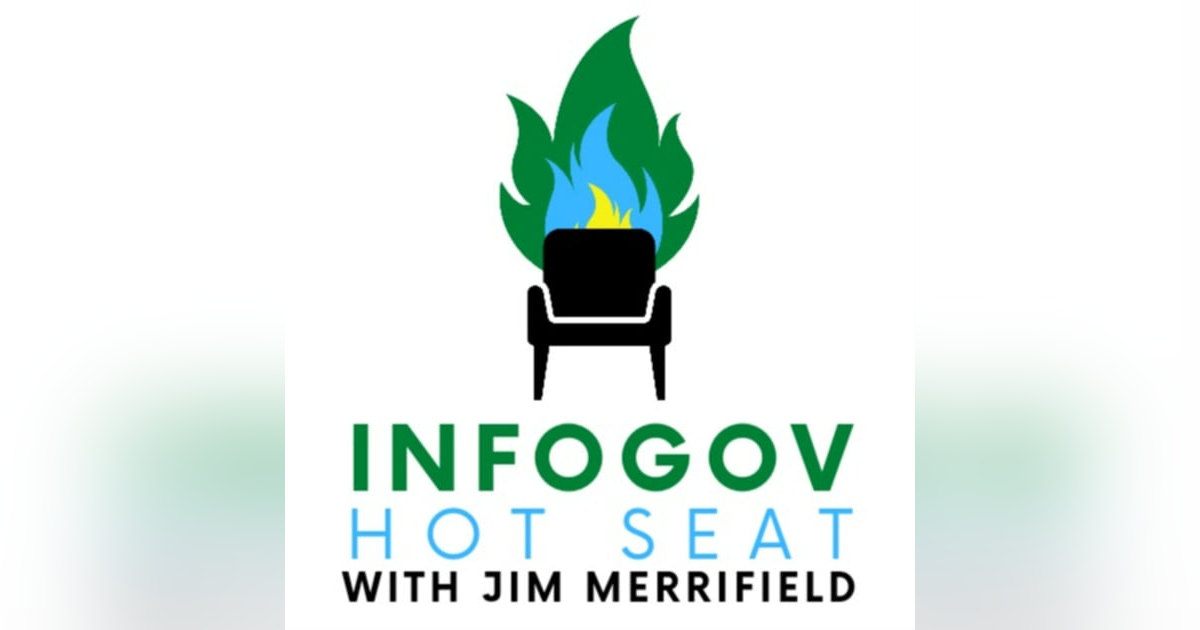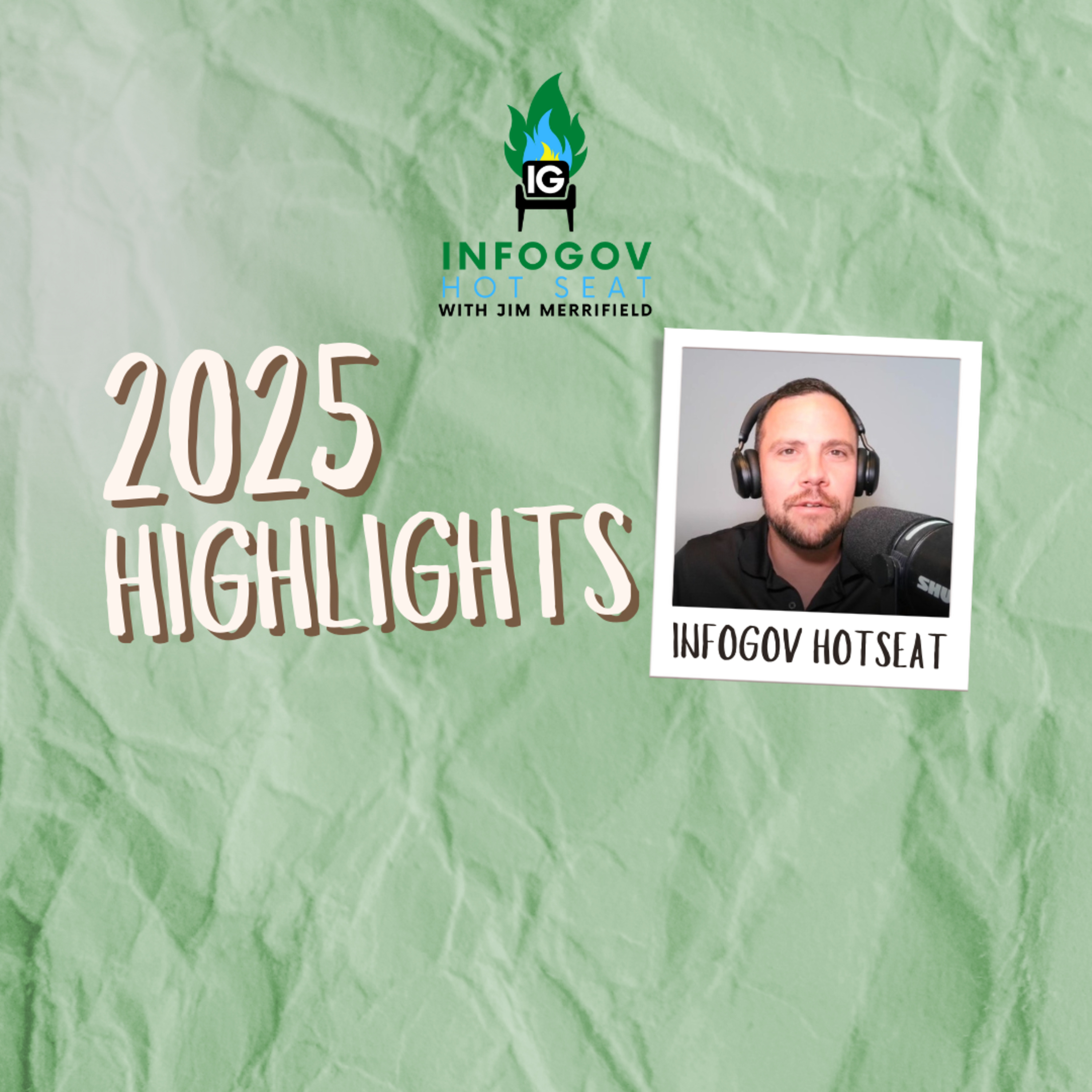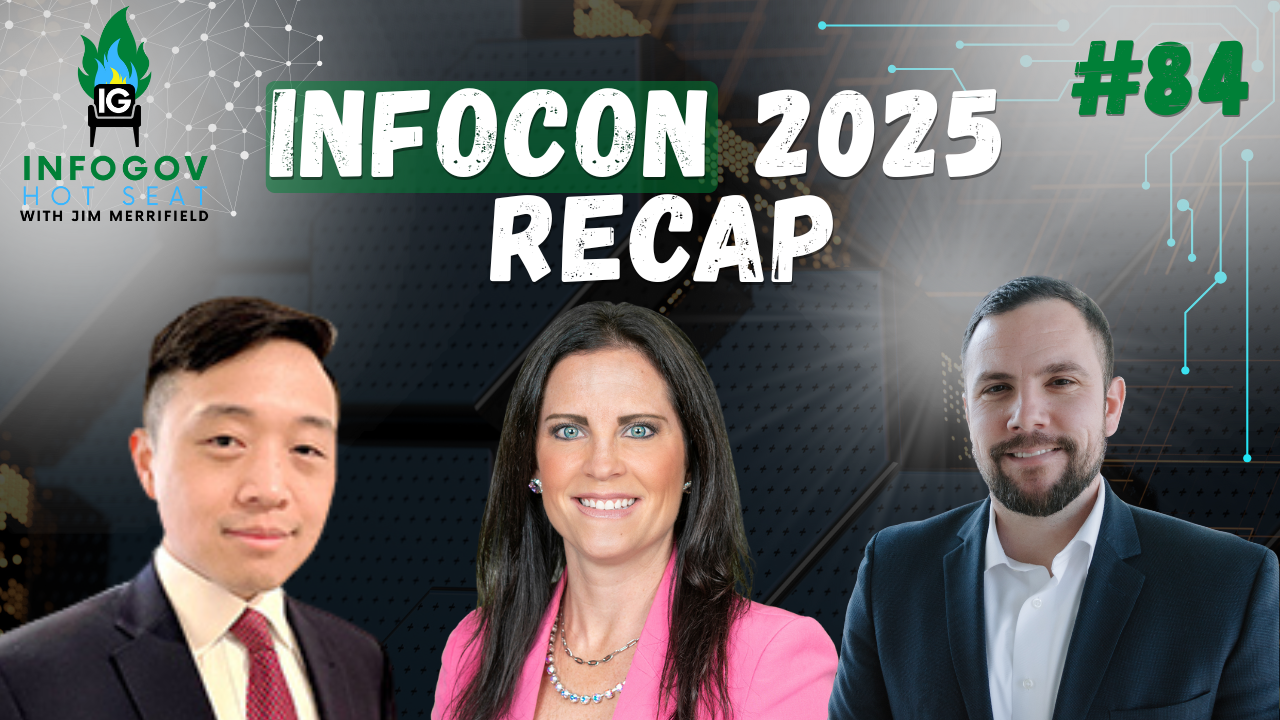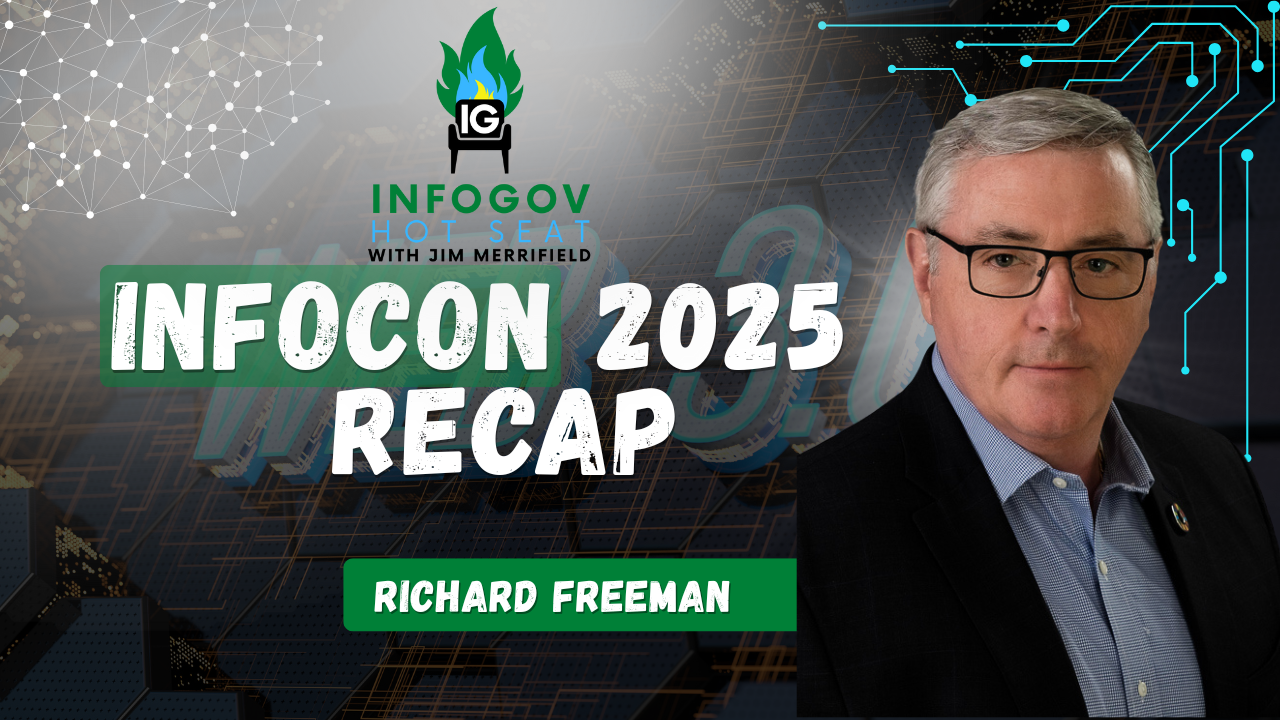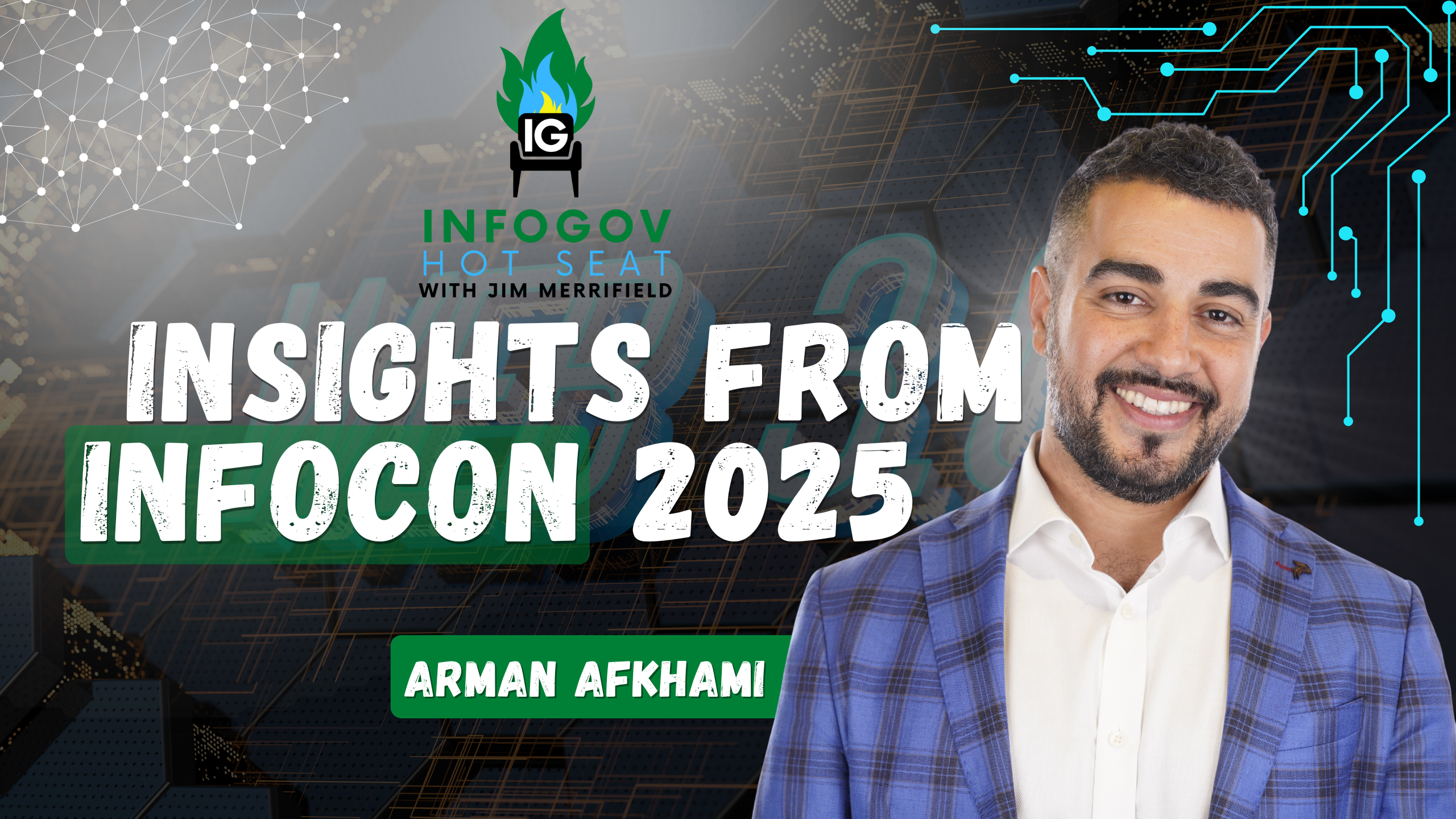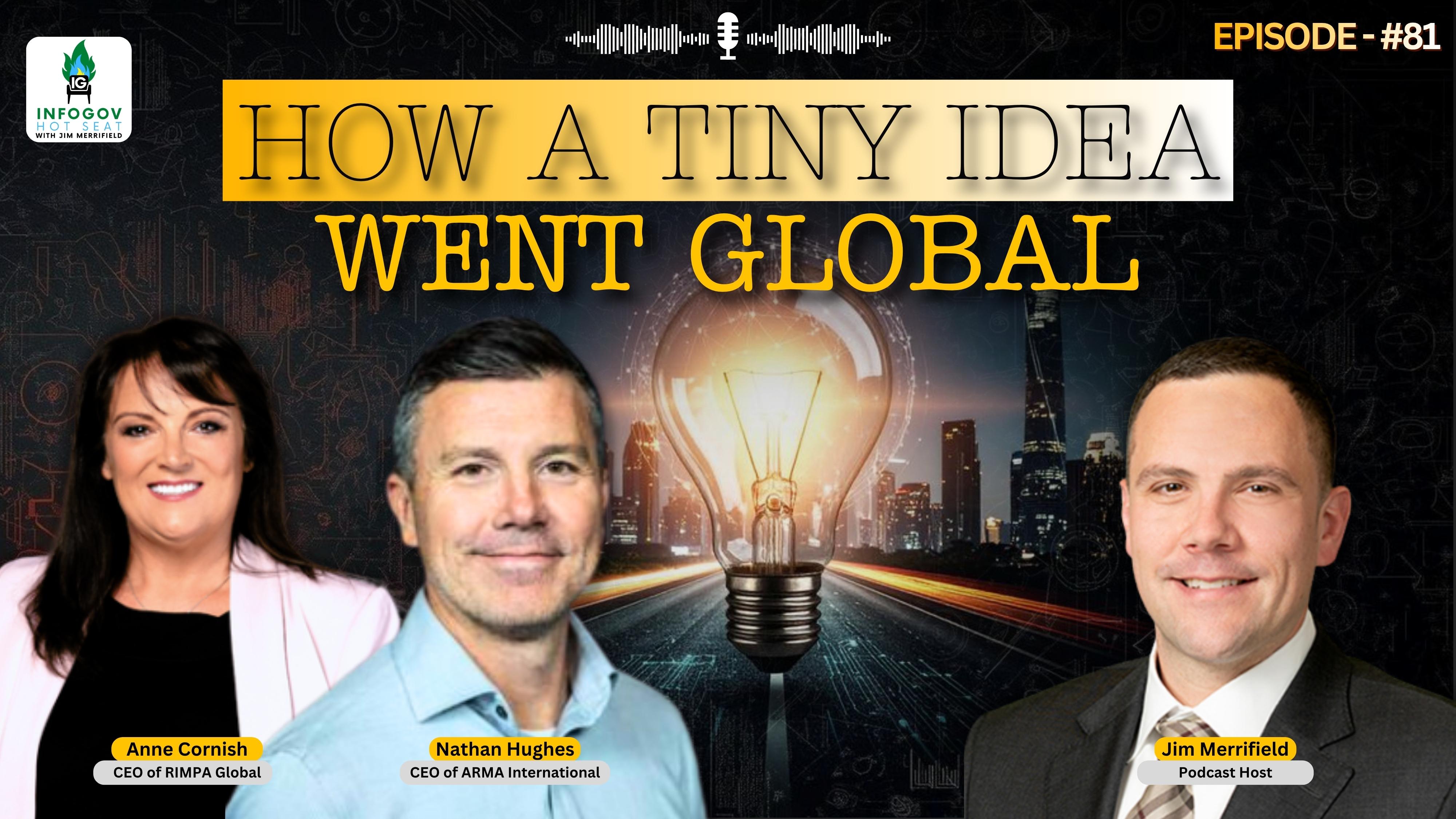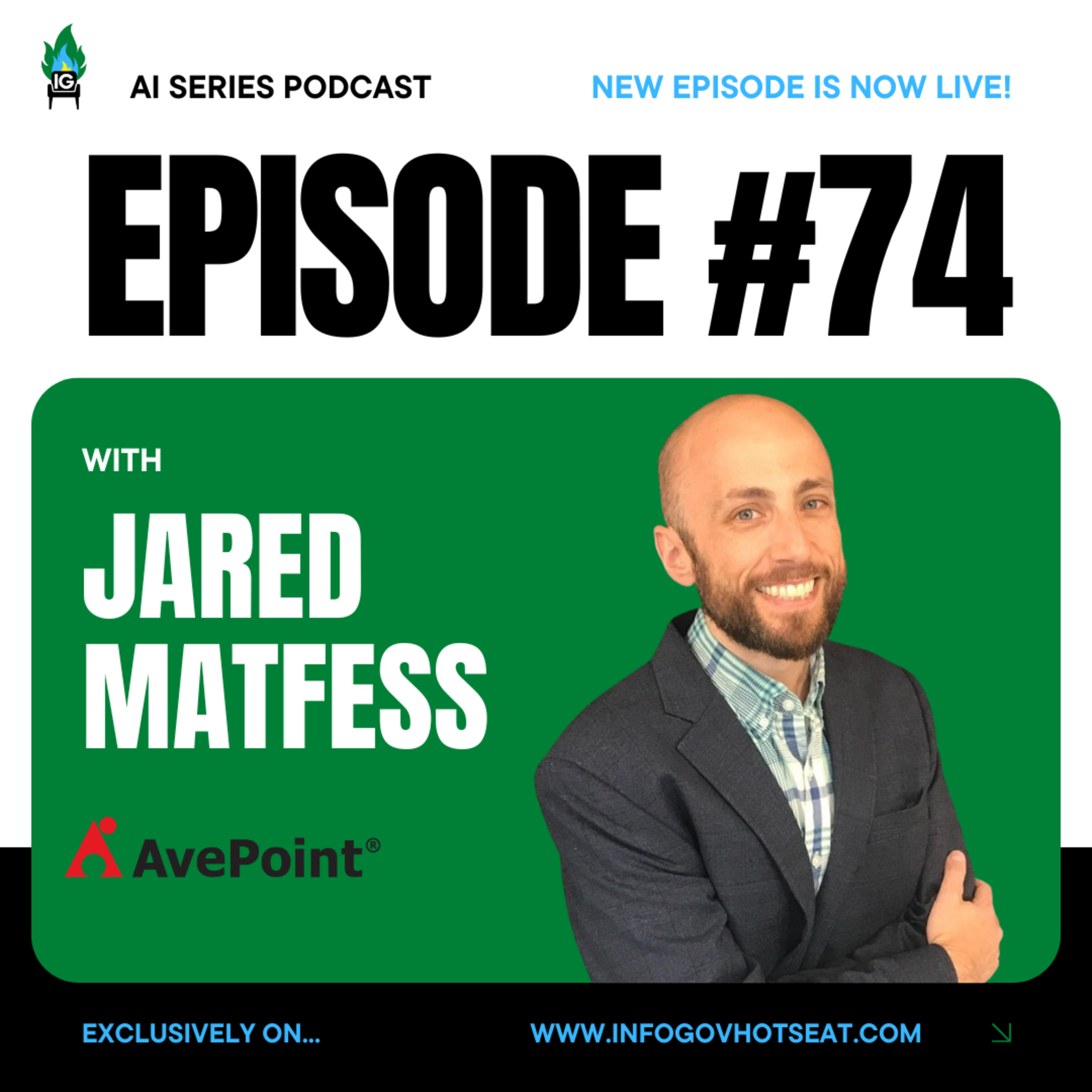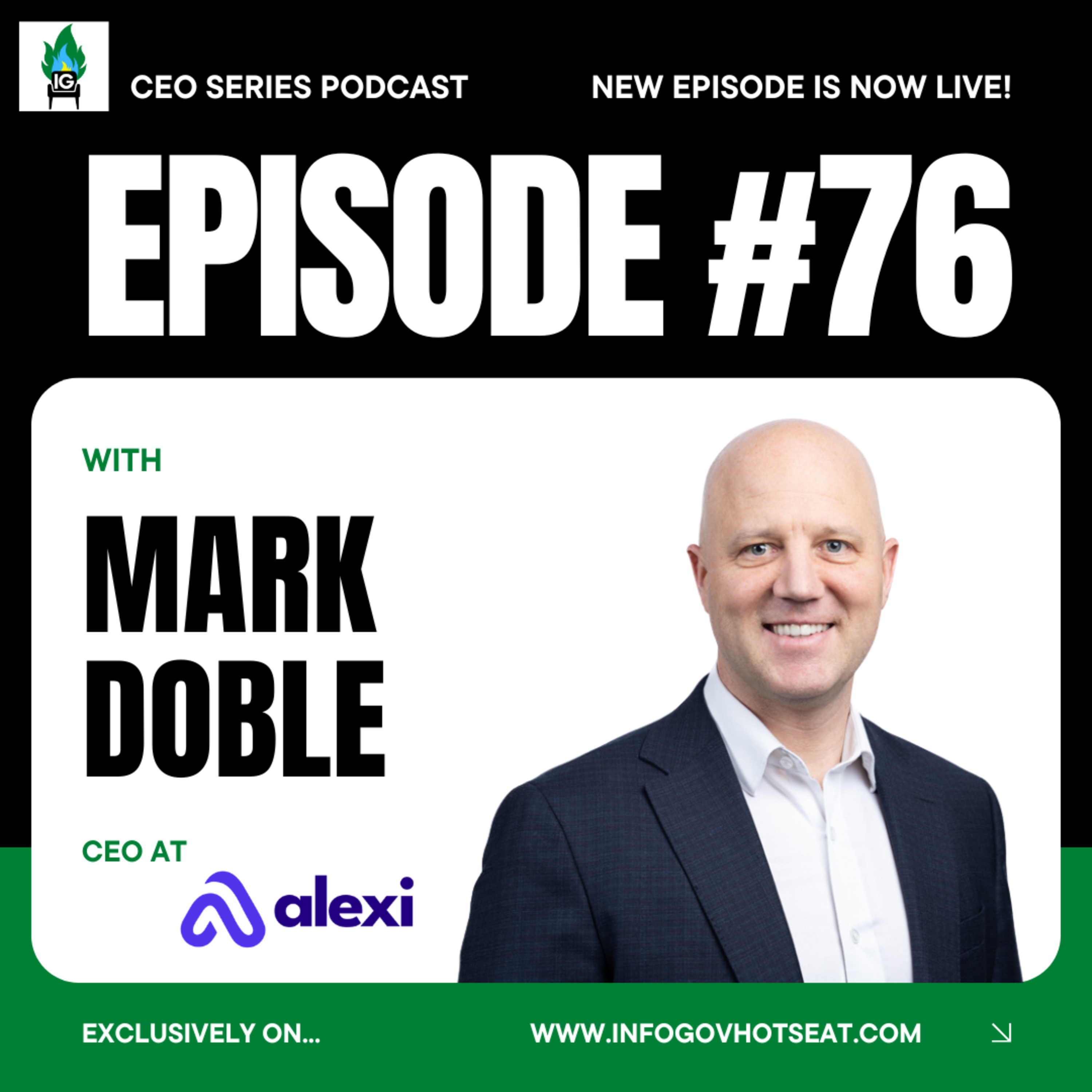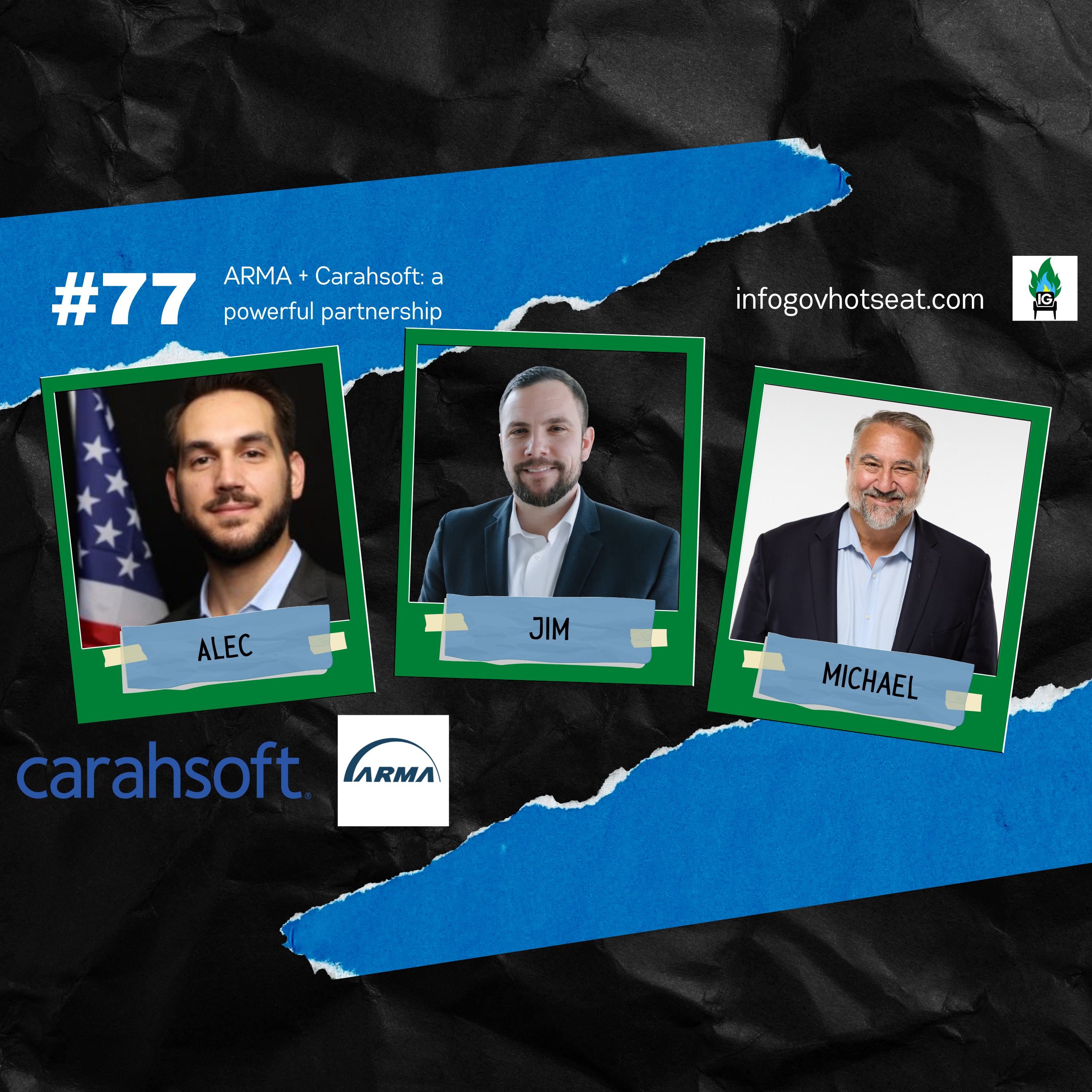IGHS52 - INFOCON2024 Recap with Tech leader, Aaron Ryssemus at Annex and O'Neil Software
In this episode of the InfoGov Hot Seat, host Jim Merrifield interviews Aaron Ryssemus, CEO of O'Neill Software and founder of Annex.com. They discuss Aaron's background, key takeaways from the Infocon 2024 conference, the importance of AI in information governance, and strategies for engaging with customers. Aaron emphasizes the need for businesses to focus on security and infrastructure before implementing AI, the significance of building systems that cater to the expectations of Gen Z, and the importance of simplifying processes in a rapidly changing technological landscape.
In this episode of the InfoGov Hot Seat, host Jim Merrifield interviews Aaron Ryssemus, CEO of O'Neill Software and founder of Annex.com. They discuss Aaron's background, key takeaways from the Infocon 2024 conference, the importance of AI in information governance, and strategies for engaging with customers. Aaron emphasizes the need for businesses to focus on security and infrastructure before implementing AI, the significance of building systems that cater to the expectations of Gen Z, and the importance of simplifying processes in a rapidly changing technological landscape.
Jim Merrifield (00:01.03)
Well, hello and welcome to the InfoGov Hot Seat! I'm your host Jim Merrifield and with me today is Aaron Ryssemus at Annex. Welcome, Aaron.
Aaron Ryssemus (00:08.812)
Hey, thanks for having me.
Jim Merrifield (00:11.868)
Yeah, absolutely. It's great to have you as a guest on the hot seat. Get to know you a little better. I know we just saw each other down in Houston last week. So before we get into the conference, why don't you let everybody know a brief introduction of yourself, your current role, and one fun fact about yourself.
Aaron Ryssemus (00:19.234)
Yep, yep, yep.
Aaron Ryssemus (00:30.574)
All right. Well, my name is Aaron Ryssemus and I'm CEO of O'Neill Software. We are the leader in commercial government record center software throughout the world. We have customers in over 100 countries. And then I also founded a company called Annex.com. so we're going through the testing out of that technology. And so it's something interesting new for the physical record center industry.
But one interesting fact about me, I had to dig through a bunch of old stories and test them with my staff. so I actually went viral before going viral was a thing. Back when there was like no word for going viral. It was probably like 2004, know, like first got into college and I was rooming with my best friend from high school. And this was back like when we were both
really into eBay and buying things on eBay and what could you find on eBay and it was when the radio stations would get on eBay like every morning and talk about the wacky weird section right and then the wacky weird section would be things like a piece of toast that looked like Mother Mary here you know do remember that? Yeah and so I remember driving down the road with my friend Tyson and saying and say Tyson you know what we should do?
Jim Merrifield (01:47.419)
I do, I do.
Aaron Ryssemus (01:55.02)
we should put ourselves on eBay as prom dates, prom season's coming up. And Tyson was like, Aaron, that's the dumbest idea I've ever heard. And then about a week later, he walks up to me and he's like, so I did it, Aaron. I put us on eBay as prom dates. And so we just thought, you know, ha ha, this is funny. And went about our life. And then the radio station started talking about it and talking about, these two guys will, you know.
go on, you you can buy your prom date on eBay now. And it kind of got big enough to where we ended up in the dean's office and we're almost kicked out of a very conservative Christian school because of this prank. But I thought the real brilliant thing that Tyson did was he put us under the wacky weird section, but he also put us under the vintage dresses.
And so girls were going on there looking for vintage dress and finding their dates. that was probably the first really valuable lesson in marketing that I had was, do you categorize yourself? So that's probably my one funny, embarrassing story. And I had to do a lot of apologies in the dean's office. And luckily, was end of the year and just kind of coasted the rest of the semester.
Jim Merrifield (03:16.392)
I'm sure you did have to do a bunch of apologies, that's a that was an interesting. Yeah, it's all about marketing positioning yourself. It's all about keywords and SEO and you seemed like you hit the keywords there on eBay.
Aaron Ryssemus (03:17.933)
Yeah.
Aaron Ryssemus (03:22.754)
Yeah. Yeah. Yeah. We never got purchased. know, we never had any beds. But we did get a lot of radio play. So, yeah.
Jim Merrifield (03:40.22)
Hey, sometimes that's all that it takes.
Aaron Ryssemus (03:41.39)
There you go. Yeah. Right. Alright.
Jim Merrifield (03:44.648)
Yeah, absolutely. So listen, know you and your company were recently attended Infocon 2024 in Houston. I know you had a great time down there. What were your key takeaways from the event?
Aaron Ryssemus (03:58.99)
You know, the key takeaway was, you know, people were very engaged. People were there, they were coming by the booth, they were having conversations, they were coming, you know, I got to do one panel and it was packed and it was on like the last day. So, you you kind of anticipate people are going to be, you know, finding other things to do. But people were very engaged, sessions were very well received when I was having conversations with people. And so, very high energy.
Last session I'd been at was Nashville, was the InfoCon in Nashville a couple years ago. And so I felt like it was very well organized. We had a great time. The hotel was very good and speakers were very good. having also attended InfoNext, I feel like the two conferences play off of each other very well. And so there's content that I'm able to pick up on at both and there's also able to, you know,
talk to people from in both avenues was very good.
Jim Merrifield (05:05.792)
that's great. And you mentioned a panel. were on a panel. Who were you on the panel with? What did you guys talk about?
Aaron Ryssemus (05:08.674)
Yeah. It was with Filers Keepers and then Gimmal and two other vendors. And just kind of talking about we're all trying to do something new, to do something little innovative in the industry, and just talking about our perspective. Yeah.
Jim Merrifield (05:33.97)
Yeah, no, that's great. That's awesome. I one of probably Wanne was the moderator, right? From filers keepers. Yeah, so I'm sure he kept everybody pretty pretty involved in the conversation. I'm sure it was a bit comical and also informative, so I don't think you could have picked a better moderator.
Aaron Ryssemus (05:38.638)
Yeah, yeah, yeah, yeah
Aaron Ryssemus (05:49.548)
yeah, he's got some great Dutch humor. He can always get a joke, get the group laughing a little bit, keep us all on target. Yeah, Wanne was great. Yeah, yeah.
Jim Merrifield (06:05.66)
Yeah, that's great. Well, I'm glad you had a great time. You know, and I love the comparison between or the synergy between Infocon and Infonext. I know I think I first met you at Infonext last year. I can't remember if it was Infonext or Nashville, but again, probably looking forward to seeing you again this year in Savannah.
Aaron Ryssemus (06:21.251)
Yeah.
Yeah, I really thought the idea of you guys bringing on the MER conference and having one conference that's really thought leadership and then another one that's more focused on the implementation, I thought that was very clever because it really gives some actionable items. And so many times you go to a conference and then it's how do you transfer that knowledge or that skills home or into your business or next thing. So you guys already thinking through that and putting that flow in.
in process, I thought was a very strong idea.
Jim Merrifield (07:00.944)
Awesome. I love the feedback. That's great. And we're glad that you're a part of it. Now, at Infocon, there were lot of discussions around AI like any other conference, right? You can't go to a conference these days and not talk about AI. What's your advice? Would you give information governance professionals to stay ahead of the curve when it comes to AI?
Aaron Ryssemus (07:01.538)
Yeah. Yeah. Yeah.
Aaron Ryssemus (07:11.042)
Yeah. Yeah.
Aaron Ryssemus (07:23.126)
You know, I think there's two things in that question. One, there's AI, and then the other is staying ahead of the curve. Right? And, you know, like there's a lot of ways that you can stay ahead of the curve that don't necessarily involve AI. But this previous week, myself and my COO, we were attendees at the Wall Street Journal Tech Conference, Tech Live in Laguna Beach.
So this is top 300 tech leaders in the world. AI is definitely a huge conversation there. And so their perspective that we definitely echo, and the way they really start off their conference was they said, number one, before you bring in AI, focus on your security. You really need to focus on your security. Focus on your clean data.
focus on your infrastructure, how are your systems communicating? And right now is in the AI cycle, right? You've got the big players who are putting a lot of money into making AI useful. While they're doing that, while they're investing the big bucks, what we should be doing is cleaning up our data and working through our technical debt and creating a secure environment. And I know no one ever thinks it's sexy to talk about
working through your technical debt, but it's absolutely fundamental. And so what we're telling our customers are, a lot of our customers have already for years had a cloud first mandate. You need to focus on a cloud first mandate. And I know that's like, you know, the trend five years ago or 10 years ago was clouds the future. people, you know, they put in policies, but they haven't quite done that. You need to first, before you worry about AI, look at,
Cloud first, look at things like single sign-on, MFA, is your vendor SOC 2, ISO, how are they keeping your data secure? Focus on the technical debt and let the big players burn through the heavy cash of figuring out how this is really gonna be impactful on your business. Because you can implement cutting edge technology that's so cutting edge that it doesn't end up panning out. And as a software provider, that happens sometimes. We start getting excited about this cutting edge technology and this is what it's gonna do.
Aaron Ryssemus (09:44.556)
And we start investing and about a year later, that team says, you know, this really isn't going where we wanted it to go. We're going to, you know, pull away from this, this platform. And then we're like, well, we've invested a lot of time in this. So, you know, so well, there's still a lot of cutting edge technology in the AI space. Your best return on investment is clean up your data, create a secure environment. And then, you know, this year, there's still a lot of talk.
about work from home versus work from office. And so, you as a CEO, I didn't call my staff back to the office after COVID. We are in the office. But what I called my staff back to was a purpose and a mission. And I said, we're not focused on where do we do work. We're focused on who do we work for. And our customers run warehouses. Our customers drive trucks. They're on the loading docks. They're not sitting in their living rooms.
So, you know, instead of being focused on at home or in the office, we said we're gonna take this 180 degrees and we're gonna say, we're gonna spend more time out in the field with our customers. We're gonna spend more time at conferences engaging other thought leaders at ARMA or engaging people at Wall Street Journal to understand where technology's going. you know, that is a bit where I would challenge
companies that if you want to stay ahead of the curve, stop worrying about whatever you're reading on LinkedIn, working from home and are we productive? You have to start saying, we're going to engage the world more and we're going to be intentional. So this is the year where I'm having more conversations with my customers. I'm sitting down in person with my customers, understanding their businesses, understanding their challenges. And then when technology is ready,
our product is going to be ready for them. when you're at conferences like Wall Street Journal, they talk a lot about the upcoming trends. What do they anticipate the growth over the next five to 10 years? And in software, when I make a choice on our product and my team and I, we decide this is a good thing to build, it takes us two to three years to get there. We're building such large systems and such complex systems.
Aaron Ryssemus (12:12.094)
that it's not like in six months we can have this out. So we really have to say, OK, what we're going to do is we're going to position our customer to ride the waves in three to five years. And if we're seeing the technology is going to be there and that the consumer is going to be there three to five years out, I'm less concerned about competition and I'm more concerned about I just have to position my customer to where their technology is ready to catch that wave and ride that wave.
and their business is going to thrive. And so if I'm going to position them to ride that wave, then we really need to be engaging them now to understand what are their needs, where's technologies at, where's the information community, where are they at? And getting people to start thinking about, one, your infrastructure. If your systems don't communicate well with each other, that's a major problem. You're not very agile.
You need to have an ecosystem for your company where your CRM and your operations and your other systems are all communicating well. Because when you do put on that AI layer, it's going to supercharge your business. But good data in, good data out. Bad data in, bad data out. so you're probably going to, you know.
Understand summing this up. It's right now. I would anticipate the next two to three years I would tell people focus on your infrastructure and security and clean data and then and then you know, I Love listening to things like Jeff Bezos where I just wrote a quote from him where he says he says he was shocked someone came up to him and said Congratulations on a great quarter Jeff and in his mind he goes I finished this quarter three years ago You know, he was like he was like
I just finished, in my mind, I just finished the quarter that's three years from now. And that's how you have to think as a tech leader. And as we bring on more technology, you have to think like a tech leader. And you have to think three to five years out. And that's a lot of what we talk about with the Annex technology, is that we're experimenting with this technology and playing with it.
Aaron Ryssemus (14:31.096)
but it's a way of being able to prepare my customers for three to five years out when they're able to white label that technology or how they choose to choose that technology, we're gonna be ready for them to take that advantage. So I know I hit you with a lot, any questions? Yeah.
Jim Merrifield (14:48.359)
Yeah, no, listen, I think it's excellent advice. mean, what I'm hearing is that I love how you're spending a lot of time talking with your customers, especially around AI and tech, because I think that's quite frankly, I think that's where a lot of solution providers fail. They kind of just push things out and expect things to just happen. And we know that's not the way to do business. So I think.
You know, we're even doing that on the law firm side, like where I am in-house talking more with our clients about how to deal with this AI concept, you know, with policies and how we can support them. And then also talking to business providers like yourself that, you know, how do we kind of all three of us, the firm, the corporation, and then the business partner, how do we all kind of come to an agreement? Because we're all trying to comply with all these AI rules and
Aaron Ryssemus (15:18.616)
Yeah.
Aaron Ryssemus (15:38.456)
View.
Jim Merrifield (15:40.168)
We want to use this technology in a safe way. And if we all don't kind of communicate and we don't understand each other's goals and what we're bringing to the table, it's kind of a, it's tough to make any progress whatsoever. yeah, what were you gonna say?
Aaron Ryssemus (15:56.544)
it's, it's, it's, it's, it's, it is really tough to make progress because you have a lot of different people that you have to get moving into the right direction and you, and it's not just getting the people moving, but you have to get IT and you have to get infrastructure and now you have to get the funding and you know, and you know, for me, I keep coming back with my team and, and coming back on, we innovate on behalf of our customer. We innovate on behalf of our customer. When we go to,
the Wall Street Journal Tech Live, we go there on behalf of our customer because we're bringing that knowledge back into their business. And my customers, these guys are, they're working hard, they're running businesses, and they don't have time to step away and to gather this information. And so we need to be their partner who says, okay, this is where technology's going, and this is where we believe your business should be positioning. And then my job as a CEO is really focusing on
who's the customer. And we're all in information management building systems to be used by people who aren't us. And if you're not building a information governance, information management system for the 22-year-old coming out of college, then you're already behind. But you need to look at, and this was my talk at InfoNext, was we need to be building systems for the expectations of Gen Z.
And looking at Gen Z, who is the first digital native generation, what are their expectations for data? What's their expectations for interacting with data, for interacting with systems? And everyone can relate to coming into a job and you look day one at the tools, whether it's the computer or the software and the desk, and you think, okay, what decisions have been made before me? What have I gotten myself into? And you think, okay, did the company make good decisions or bad decisions?
And as information managers, we need to be creating systems so that when that employee comes out of college and they step into the office, they're able to interact with technology in the way that they interact with technology. And that means, one, mobile first. When I was at Infocon, I looked around, how many service providers, how many vendors have an app at Infocon?
Aaron Ryssemus (18:20.85)
Zero. Zero. Zero. No one. No one had an I didn't have an app. I looked around. No one had an app. when you look at the data, eight out of 10 information managers are asking for an app. And when you look at how much time a person spends on their phone, we are spending on average five hours a day on our phone. You know, when you're talking about
Jim Merrifield (18:22.472)
Yeah, yeah, there's not many. Yeah.
Aaron Ryssemus (18:46.082)
building an information management system, it's honestly, not just features and functionality, but it's also about what devices are someone on. How are they interacting with it? And so, you know, there's that bit where until you really look at the data, you realize, man, how are my current vendors actually creating products that my employees will want to use? And where's the value? But coming in with,
mindset of building a system for Gen Z, you have to first say it has to work on the mobile device. And if you're working with vendors, I would be less concerned with my vendor talking about AI, and I'd be more concerned with my vendor talking about security and mobile first. then, because that's Gen Z, and AI is going to be ready, but...
but that's how we're going to be interacting with those devices, with that logic. I also think that with AI, what I'm going to be looking for and what I'm looking for out of my own product whenever we do finally bring AI into it is software is very much sold on what new features and functionality did my vendor come out with this year, right? And what features does this software have that their competitor doesn't have? I believe with AI,
what we should be talking about is removing features and functionality. And AI, the conversation should be, how much of my time did you give me back? And I would love to hear my software vendors tell my finance team or my marketing team saying, we've removed 50 features this year and we're giving you back 45 minutes of your day. That is the power of AI. so.
That's what I would love to see our industry gravitate towards.
Jim Merrifield (20:46.6)
Yeah, I mean, look, there's that's why I think copilot and the others is so attractive. just for mundane tasks, you know, people just don't want to summarize emails anymore or waste time on, on first draft. I mean, this is like easy stuff with like AI. It's like AI basics, but even those basic mundane tasks, I mean, lawyers spend a lot of time doing that stuff. So do paralegals, so do legal assistants. So, you know, this is kind of one example on how AI can
Aaron Ryssemus (20:49.334)
Yeah.
Aaron Ryssemus (20:54.616)
Yeah.
Aaron Ryssemus (20:59.917)
Yeah.
Aaron Ryssemus (21:07.681)
Yeah.
Jim Merrifield (21:15.24)
can kind of take over and improve processes. But you mentioned something about Gen Z and just to kind of close the loop on the conference. There was, think about, I know, I gave like a first timer. There was a first timer reception, I think on Monday night. And it was a packed room. It was standing room only. And there was over 100 first timers. And many of the first timers in the room at Infocon this year were very young.
Aaron Ryssemus (21:18.284)
Yeah, yeah, yeah.
Aaron Ryssemus (21:27.884)
Yeah. Okay.
Aaron Ryssemus (21:42.22)
Yeah. Yeah. Yeah.
Jim Merrifield (21:45.072)
And that was super encouraging to see because at an ARMA conference, a lot of times it's very mixed, very middle-aged and this and that. So it was nice to see almost like maybe this is the next generation of information management professionals coming up right before our eyes.
Aaron Ryssemus (21:46.67)
Yeah.
Aaron Ryssemus (21:52.535)
Yeah.
Aaron Ryssemus (22:03.31)
I think we should anticipate that because people tend to hold on to their jobs during something like a pandemic and the economy becoming more stable and people are more comfortable retiring. You're going to see more people stepping into those positions. you know, how, you know, are you guys talking on your side about how the conference is going to be changing?
for Gen Z. Is that a current topic? Yeah. Yeah.
Jim Merrifield (22:37.18)
Yeah, yeah, we're constantly talking how we can reach, I guess, the new member, right? The new and up-comer. That's why we do some of those first-timer receptions. And a lot of the conferences, at Infocon, has a progressive, it's like beginner, intermediate, advanced, and things like that. And it was encouraging, even on the expo floor, seeing a lot of our business partners having younger,
Aaron Ryssemus (22:43.052)
Yeah. Yeah.
Aaron Ryssemus (22:48.792)
Yeah.
Aaron Ryssemus (23:01.581)
Yeah.
Aaron Ryssemus (23:06.414)
Yeah. Yeah. Yeah.
Jim Merrifield (23:06.876)
different people at their booths. It wasn't the same old people, which is really telling too. So think our industry is definitely moving in that direction. So Aaron, listen, I know we talked about a lot here and I know you're in LA, right? You're in California.
Aaron Ryssemus (23:14.892)
Yeah. Yeah. Yeah.
Yeah. I'm in, we're based in Irvine, California. Yeah. Yeah. Yeah. Okay. Man. Yeah.
Jim Merrifield (23:28.008)
Alright, yeah, you basically listen I'm on the I'm in Connecticut. I'm close to New York. You're close to LA. You know where I'm going here, right? So, you know this week, right? We have the World Series tonight, right? Because we're taping this. We're going to release this thing in probably a few days. Are you a dodger fan?
Aaron Ryssemus (23:39.351)
Okay.
Aaron Ryssemus (23:43.276)
Yeah. I am not. I'm not. I never really got into sports. But yeah.
Jim Merrifield (23:47.249)
Okay.
Jim Merrifield (23:51.176)
All right. All right. I love it. I love it. So now you're a Yankee fan now, so that's good.
Aaron Ryssemus (23:54.83)
I'm a fan of food. will show up, I'll hang out, I'll eat whatever foods at the venue. But yeah, yeah.
Jim Merrifield (24:07.016)
All right. Yeah, that's good. We don't have to have that conversation. So listen, we talked about a lot here. No, it's all good. So listen, I'm looking forward to it. I Infocon was like our world series. So we're talking about that subject anyway. So anything else you'd like to share, Aaron, before we let you go, to the audience?
Aaron Ryssemus (24:10.158)
Sorry. Yeah, yeah, yeah.
Aaron Ryssemus (24:19.832)
Yeah.
No, you know, I would say the last thing that a lot of people are talking about with AI is that you can't think of it as like you're implementing a new feature or a new product. And you have to think of it like you're bringing on a new employee. And it's, you're running a marathon and it's going to continuously change. And so, you know, don't overthink it, start playing with it.
But AI is going to become part of our business and our life. It's not gonna be like a one and done, you brought it in. I would also say something that I think is going to become really important, I think it's always important for business leaders is focus. And you look at really successful people and they're always laser focused. when we are being hit with more tools than ever of co-pilot and chat and look at this and look at that, look at that, you're as an information manager,
the more you can say no, the more you can limit how many products you're using, the less busy you're going to be. I think that's even in building product, Like I have to say no to 99 things, and I'm going to say yes to the one thing that creates the most value for my customers. And so, you know, setting up information management and looking at the AI, spend your time, do your research, you know, don't overthink it, but limiting yourself because
we're in this world where it's just going to be more chaotic and there's more things in our face all the time. And so the more you can simplify your systems, the better.
Jim Merrifield (25:56.808)
Yeah, I mean, we're saturated. mean, I was at another conference called ILTA, IltaCon. It's like a legal technology conference and this past summer. And I walked on the floor and there was the expo floor and there was like 20 startup AI companies, right? And, you know, I'm sure half of them will be gone next year, but like to your point, you know, you can't buy all of them. I mean, you can, but you're going to end up using probably one or two of them. So I think.
Aaron Ryssemus (25:58.68)
Yeah.
Aaron Ryssemus (26:10.744)
Yeah.
Jim Merrifield (26:25.128)
Your advice is listen, be selective, And kind of know what your, do your diligence first and know what your strategy is before you start just buying things. Because everybody's giving away software for next to nothing these days, right? For AI.
Aaron Ryssemus (26:32.174)
and
And be prepared to prune away systems, right? You bring in systems, you're gonna have to retire systems. that's, you know, having that flexible architecture and having a cloud first philosophy where you're connecting with APIs, you're not on a server, it gives you that flexibility to be able to adjust with technology. yeah, we're a best of breed solutions provider, so we only build record center software.
and we build to the highest standard. That's why we have a cloud product. That's why, you know, we're, have customers in a hundred countries. If we do one thing, we do it, we do it really well. When you have a software vendor who says, do more with us, they don't really do anything well, right? When they say, we're your, we're your this software plus we're going to do your CRM and your finance and they say, they cannot compete with these big players with, with all of the R and D. And so having a best of breed philosophy, a cloud first philosophy means you're, you're going to have that.
that flexibility to adjust as technology adjusts, as your company needs adjust. But yeah, I definitely have a big believer in pruning and saying, the more complex you get and the more integrated you get with these systems, the less agile you get. And so you have to understand that there's a trade off on all of this.
and then speak to your vendors and talk to your vendors and understand where they're going. But I feel like we could keep talking. But I know this is like a 15 minute format. yeah, yeah. OK, Good. Yeah.
Jim Merrifield (28:11.729)
yeah.
Jim Merrifield (28:15.912)
Listen, no, it's all good. We're gonna have to do a part two, you know, for sure. We're gonna have to do a part two. I'm sure I'll see you at Info Next. And again, Listen, Aaron, thanks so much for all your support of ARMA, your time here on the InfoGov Hot Seat. Really, really appreciate your time out of your day, especially on a Friday. yeah, listen, and for our audience, if you'd like to be a guest on the InfoGov Hot Seat like Aaron here, all you gotta do is...
Aaron Ryssemus (28:26.862)
Aaron Ryssemus (28:32.898)
Yeah, thanks. Thanks. Thanks. Thanks.
Jim Merrifield (28:44.592)
Submit your information through our website, infogovhotseat.com Thank you so much and enjoy the rest of your day.
Aaron Ryssemus (28:46.242)
Yeah. And then you do have to tell one embarrassing story about yourself. Right? That's it. That's the catch. That's the catch. You gotta tell one embarrassing story. All right, cool. All right. Cool. Yep. All right, you too. Thanks.
Jim Merrifield (28:53.106)
Do you do? Yeah. Don't forget that one.
Jim Merrifield (28:58.374)
I like it. Cool, awesome. Aaron, have a great day, all right?

Founder and CEO
Visionary Tech Entrepreneur, Innovator, and Advocate for Youth Development
Aaron Ryssemus is a dynamic entrepreneur and visionary leader, serving as the CEO of O'Neil Software, a global leader in records and information management solutions. Under his guidance, O'Neil Software has expanded its innovative offerings, particularly through its flagship cloud-based platform, O'Neil Stratus. This platform has set new standards in managing chain of custody and records lifecycle management by delivering unparalleled operating and financial efficiencies to records centers worldwide.
As the Founder and CEO of Annex.com, Aaron is extending O’Neil’s 40-year track record of innovation on behalf of their customers by enabling information governance organizations to harness real-time cross-records center data management and an e-commerce platform tailored for records management.
Aaron's journey in the tech world is marked by his relentless pursuit of innovation and excellence. His ability to foresee industry trends and his commitment to developing pioneering solutions have positioned both Annex.com and O'Neil Software as leaders in their respective fields. Aaron's leadership has been instrumental in shaping the future of records management and information solutions, impacting over 1,000 record center locations across 88 countries.
Beyond his technological achievements, Aaron is passionate about the next generation of innovators and leaders. He founded an outdoor immersion and environmental education program for inner-city youth and has vo…
Read More
